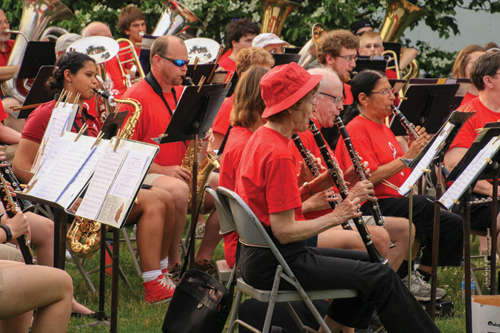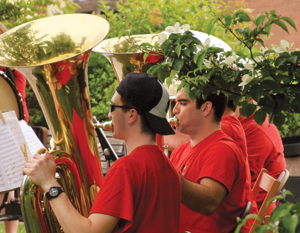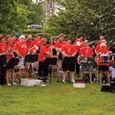
The sounds of summer can mean many different things. For some, they are the sounds of a baseball game, a day at the beach, or an amusement park ride. In our world, they can be the Boston Symphony Orchestra at Tanglewood, a conducting institute, or a drum corps. My summer soundtrack has long involved the melodious sounds of community bands.
I first became involved in community bands at the start of my teaching career. Even before the first day of classes at West Marshall High School (State Center, Iowa) in 1998, I had already made my local debut, conducting our summer community band. Over the next four years, I found the summer band just as rewarding as anything I did during the school year. Our membership consisted of a few high school students with most everyone else coming from all different walks of life. We gave concerts in conjunction with the downtown farmers market and played for local festivals. It was something our community enjoyed and was just as beneficial for me. It kept me conducting throughout the summer and showed that I was more than the high school band director. I was involved in the life of the community throughout the entire year. Important connections were created.
Seventeen years later, I have just completed my second summer as conductor of the Amherst Community Band. We gave six outdoor performances this summer ranging from a regular concert series in a downtown park to a concert at the local Survival Center to help raise awareness of its programs. The Amherst Community Band has a membership somewhere in the 40s-50s; I am never exactly sure. There is no audition, nor any particular attendance requirement. On any given date, the horn section can range from five players to one. Three is a good number of percussionists, but in one performance, we used a one man band in that section, not unlike Dick Van Dyke at the beginning of Mary Poppins. While this uncertainty might drive some conductors crazy, I think it just comes with the territory. As my predecessor at the University of Massachusetts, George Parks, famously said, “Band is for everyone.” The informal nature of a volunteer summer band is what often attracts players. I call it band à la carte as members choose the rehearsals and concerts that fit their schedules.
Admittedly, it can take a while to get used to a laissez-faire ensemble. By our nature, we directors tend to want to reduce the variables in our groups. A summer volunteer band, though, requires a certain acceptance. This goes for seating, too. No one auditions for part assignment; people gravitate to where they feel comfortable. With only minimal adjustment, we have gotten all the trumpet/cornet, clarinet, and trombone parts covered.
The Amherst Community Band is a completely voluntary operation; no one is paid. Because I am a faculty member at UMass, we use its library, rehearsal space, and equipment. Approximately a fourth of our band members are either current UMass students or recent graduates. The rest of the band comes from all walks of life. Our youngest member is a 7th grade trombonist. I will remain silent with who is at the opposite end of the spectrum. Though we do have a few future, current, and retired music educators, the majority of our members are amateur musicians. It is a love of making music that brings us together. I recently surveyed the membership to find the reasons they participate. The most common responses were having an outlet to make music in a group setting, the camaraderie inherent in a musical ensemble, and the feeling of giving back to our community through providing free public concerts. As one person wrote, “I like that it includes a broad range of musical and life experiences. It’s nice to get to know others who share a passion for music in our community.”
The survey responses also made me think more about what community bands offer the conductor. One respondent wrote, “I like that it’s time-limited, leaving room for me to engage in other interests, including travel.” The Amherst Community Band rehearses for two hours once a week; we typically have two rehearsals and then a concert. Each concert is usually around one hour and includes 8-10 pieces of music. Granted, some of those pieces we play often and rehearse little (Stars and Stripes Forever, I am looking at you). Still, 240 minutes to prepare 60 minutes of music can be a challenge.
 Literature choices have to reflect variety, appeal to the audience, and challenge the players but yet be achievable in the limited time. With uncertain attendance and varying ability levels, it sometimes is an educated guess as to whether a piece can be performed successfully. Marches are almost always a sure-fire winner. Anything with essential percussion parts beyond snare drum, bass drum, and cymbals could be problematic.
Literature choices have to reflect variety, appeal to the audience, and challenge the players but yet be achievable in the limited time. With uncertain attendance and varying ability levels, it sometimes is an educated guess as to whether a piece can be performed successfully. Marches are almost always a sure-fire winner. Anything with essential percussion parts beyond snare drum, bass drum, and cymbals could be problematic.
Rehearsing requires a balance: the social aspect of the band is an essential, and every schedule needs to include time for a halfway-point break to accommodate this. A good story can add much to the rehearsal, but the clock is always ticking. As I often remind myself, people give up a free summer evening to play their instrument; they did not come to hear a lecture.
For anyone who has not worked with adult musicians before, it can be a striking difference from the school environment. Our players are not afraid to share their thoughts. If my conducting is not clear, I hear about it. In many ways, I find this refreshing. A volunteer group does not need the maestro/musician divide. An open collaboration between peers can be quite rewarding, especially coming during the respite between the school years. I have found adult musicians to be much less judgmental. No one is afraid to make an error. Honestly, a joking response to a musical suggestion you offer sometimes just fits the summer mood. At the end of the day, it is all about people who enjoy making music with others. It is not a competition, and there are no paychecks at stake. A good-natured zinger in rehearsal may be just what you need to keep in touch with why we do band in the first place. At the same time, adult musicians can be more open in their appreciation. It is not uncool to let directors know they are doing a good job.
My last thought on why community bands are important is that musical enjoyment can last a lifetime. I have too often seen musicians view band only as a school activity, something put aside when they move into their next stage in life. Community band provides an outlet to change that mentality. Two years ago, I invited another local community group, the Florence Community Band from Northampton to share a concert with the UMass Concert Band. I am an on-again/off-again tuba player in the Florence Band, and I thought it would be important for the UMass students to see first-hand how playing in band goes on beyond college.
Both bands played their own sets and then we combined for a grand finale. That might have been the most valuable part. The college students sat next to the community band members and saw how music can last for a lifetime. I am hoping the lesson takes root in them.
Few students will go on to become professional musicians. If we believe that what we teach as music educators is important for all students, we should encourage music-making beyond our doors. I cannot imagine our peers in the English classes feeling content with the idea of reading only for study. There are countless resources to read for a lifetime. Community bands give us the opportunity to do the same with group music making.
The summer is nearly gone. The sounds of the Amherst Community Band are replaced by the equally beloved sounds of the UMass Minuteman Marching Band. Soon, our campus is full of student music-making, from jazz ensembles to choirs to percussion groups. When the school year comes to its inevitable close in May, the sounds of a band will carry on. It will be time for another great summer of community band. If you have the opportunity to start a community band in your area, I highly encourage it. You will help others enjoy those indescribable intrinsic rewards that come from music making, and just might become a better conductor through the experience. I know I have.






